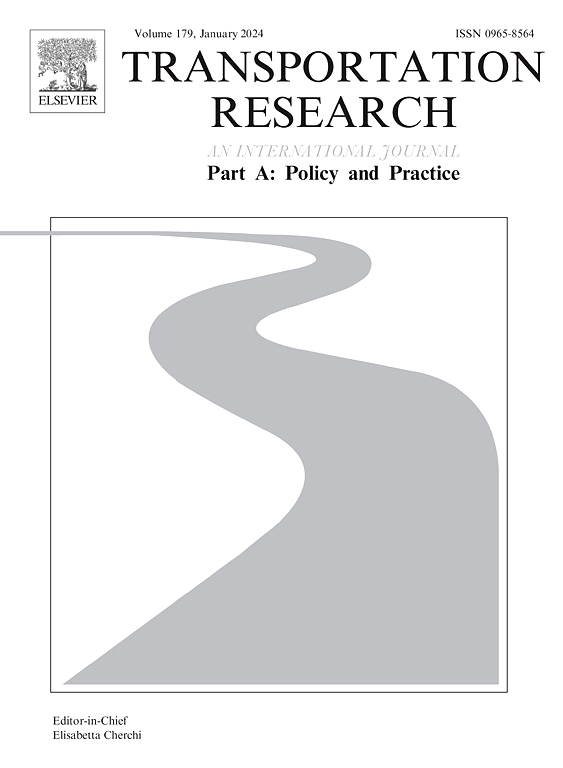Eco-Lanes: A flexible lane management scheme for enhancing traffic efficiency and promoting eco-friendly commuting
IF 6.3
1区 工程技术
Q1 ECONOMICS
Transportation Research Part A-Policy and Practice
Pub Date : 2025-03-25
DOI:10.1016/j.tra.2025.104458
引用次数: 0
Abstract
Existing high-occupancy vehicle lanes and other managed lanes typically cater to a single vehicle type, leading to suboptimal utilization. A new lane management scheme, termed eco-lanes (ELs), is introduced in this study to provide a more flexible operational framework, enabling authorities to designate various vehicle access types across different road segments. We conceptualize ELs as instrumental in enhancing traffic flow efficiency and promoting the adoption of eco-friendly commuting practices. To assess the quantitative impacts of ELs on commuters’ mode and route choices on network operations, a combined mode split and traffic assignment (CMSTA) model is developed, where a cross-nested logit (CNL)-based multi-mode passenger assignment model addresses route overlapping, and a nested logit (NL)-based mode split model accounts for the hierarchical choices of vehicle type (manual driving or auto driving) and commuting modality (driving alone or shared mobility). Formulated as an equivalent variational inequality (VI) problem in path-flow space with asymmetric link impedance functions, its equivalence is established. A new iterative solution algorithm integrating route-swapping, mode-swapping, and weighted adaptive self-regulating average techniques is developed to efficiently tackle the CMSTA problem. By reformulating the CMSTA as an equivalent nonlinear programming (NLP) problem and taking the multimodal stochastic system optimum (MSSO) as the objective, we further propose a mixed-integer nonlinear program (MINLP) for optimal EL network design. Numerical examples demonstrate the effectiveness of the EL scheme in mitigating congestion, not only optimizing network flow but also promoting eco-friendly mode shifts.
求助全文
约1分钟内获得全文
求助全文
来源期刊
CiteScore
13.20
自引率
7.80%
发文量
257
审稿时长
9.8 months
期刊介绍:
Transportation Research: Part A contains papers of general interest in all passenger and freight transportation modes: policy analysis, formulation and evaluation; planning; interaction with the political, socioeconomic and physical environment; design, management and evaluation of transportation systems. Topics are approached from any discipline or perspective: economics, engineering, sociology, psychology, etc. Case studies, survey and expository papers are included, as are articles which contribute to unification of the field, or to an understanding of the comparative aspects of different systems. Papers which assess the scope for technological innovation within a social or political framework are also published. The journal is international, and places equal emphasis on the problems of industrialized and non-industrialized regions.
Part A''s aims and scope are complementary to Transportation Research Part B: Methodological, Part C: Emerging Technologies and Part D: Transport and Environment. Part E: Logistics and Transportation Review. Part F: Traffic Psychology and Behaviour. The complete set forms the most cohesive and comprehensive reference of current research in transportation science.

 求助内容:
求助内容: 应助结果提醒方式:
应助结果提醒方式:


